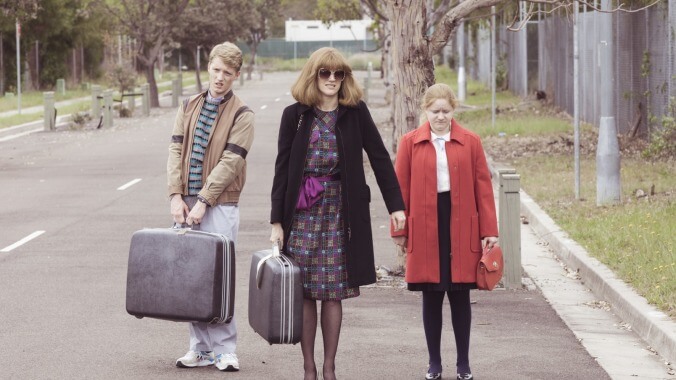Sammy’s former life was built on falsehoods, making her not all that different from her dead, bad husband. She changed her name, traded her Australian accent for a British one, and lied so much about her personal background that her kids have no idea who she really is or where she comes from. Those lies unravel quickly once the Cooper family lands in Newcastle and moves in with Sammy’s recovering alcoholic mother Jean (Kerry Armstrong) and man-child brother Jim (Ben Mingay). Ashamed of her working class upbringing and addict parents, Sammy worked hard to erase much of her past. Frayed only skims the surface of Sammy confronting that shame, often relying too much on punchlines and physical comedy in a way that undercuts some of the emotional resonance of Sammy and her family’s arc. It’s undeniably a dramedy, but sometimes it struggles to marry the drama with the comedy, yielding underbaked narratives and surface-level character development.
Stories about rich people losing their money have been told by TV before, with Schitt’s Creek and Arrested Development being some of the finest examples. The latter has the benefit of being absurdist, and Schitt’s Creek offers a masterclass in humanizing characters who start off cringingly self-centered. Frayed is somewhat in conversation with these shows, but it doesn’t offer much new to the narrative. Everything from the emotional beats to the punchlines is fairly predictable, which isn’t necessarily the show’s undoing. But the lack of surprise in its characters and stories makes the series lag in parts, especially in the middle of the season.
Sammy’s arc is simultaneously straightforward and also a little hazy. She considers herself a victim. And sure, her husband did lie to her. But Sammy is wildly selfish herself, cutting herself off from her family and not even so much as checking in for years. Darkness in the family’s past helps explain some of that, and grief does bubble up in a few unexpected places that make for standout moments on the show, but Frayed stays at the surface of a lot of these contradictions and complications. It does help that Sarah Kendall—who also wrote all six episodes—gives a fantastic performance as Sammy both in the overtly comedic moments and more acerbic ones.
Some of the subplots manage to surprise and add texture to the series. On the weaker side of things, there’s Jim and his attempts to woo his scam-loving girlfriend Bev (Doris Jounane). Jim never fully clicks into place. He’s indolent, sexist, and racist (Sammy and Jim are both persistently racist toward the show’s only Chinese character, a fact doesn’t serve any real purpose). There are pockets of tenderness meant to soften his edges, like how he genuinely cares about the well-being of Sammy’s kids Lenny (Frazer Hadfield) and Tess (Maggie Ireland-Jones). And some of the anger he harbors toward Sammy is justified. But Jim is more often just a punchline, and not even a very good one at that. Frayed milks as much as it can from the sibling tension between Jim and Sammy, but doesn’t complicate it until the very end. The character development and humor feel at odds with each other in Frayed—Jim and Sammy’s dynamic in the finale provides a satisfying emotional arc, but it’s haphazard in the build-up.
On the stronger end of the subplots, Jean’s arc as she follows a parallel path of self-rediscovery has some of the finest writing in the series. Sammy’s mother reconciles with the regrets she has in life, with the realization that she never really got to be herself. She struggles to re-learn how to date now that she’s sober. Kerry Armstrong is deft in these vulnerable moments but also remarkably funny. Sammy’s daughter Tess has a lovely side-story with the troubled girl next door that touches on the fraughtness, dangers, and confusion of young girlhood. It’s easily the best executed story of the many that Frayed offers.
Ultimately, Frayed tells several stories of coming-of-age at once. In Sammy’s case, she’s coming-of-age late-in-life, realizing how much harm she has caused others. The series also contains commentary on men in power and the ways they feel entitled to women and wealth, though Frayed doesn’t always hit the mark there, especially when it comes to Sammy’s dynamic with her boss Chris (George Houvardas), a former classmate. Her reconnection with her high school love interest Dan (Matt Passmore) sparks more interesting character development. And the series does pack in a lot of laughs, especially in some of its runners, which include Jim’s obsession with Dynasty and other 1980s pop culture touchstones woven throughout. The comedic rhythm of the show is strong even when the overall structure sags. But Frayed is middling a lot of the time, especially when it comes to its emotional stakes and the more dramatic tensions that surface and then quickly flatten into an easy joke.









































